Apple AirPods Pro vs Apple AirPods (2019): Which should you buy?
Apple’s AirPods Pro seem to have the AirPods (2019) outmatched in nearly every way. Active noise-cancelling (ANC), improved battery, and a better fit leave the AirPods Pro feeling miles ahead for iPhone owners, and even make an okay choice for Android users. The real question is whether or not the AirPods Pro ($249) are worth the steep asking price, or if the AirPods ($159) deliver better value for your money. Find out in this Apple AirPods Pro vs AirPods comparison.
Our verdict: 2019 AirPods review | AirPods Pro review
Apple AirPods Pro vs Apple AirPods (2019)
Design
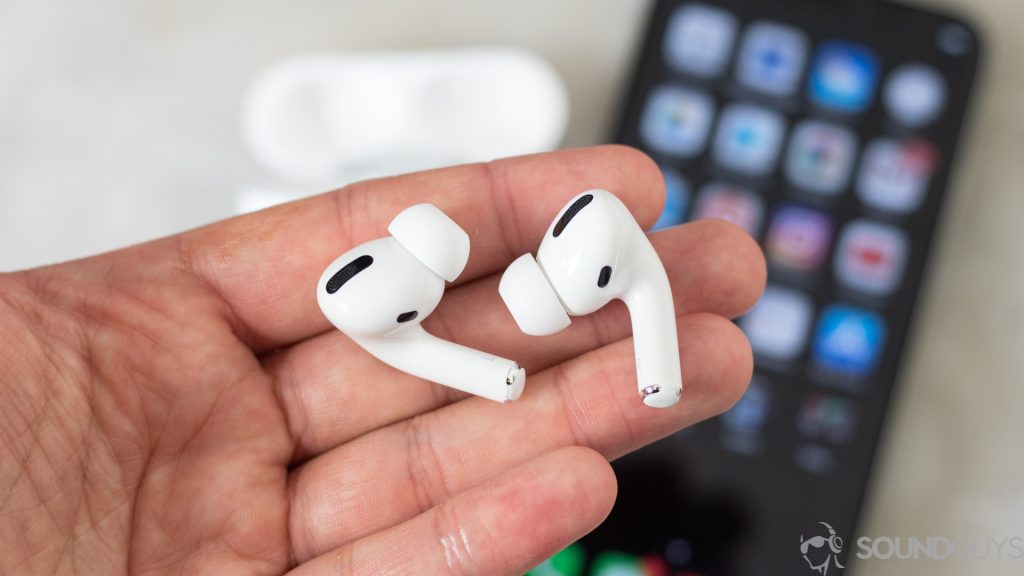
The AirPods Pro are the first AirPods to sport interchangeable ear tips, something iPhone owners wanted since the original AirPods release. The open-fit AirPods don’t seal to the ear, which severely degrades audio quality. While this makes it easier to hear your surroundings without a seal, it has a negative impact on sound quality as external noise drowns out the detail in music as a result of auditory masking.
Headphone buying guide: A beginner’s guide to all things headphones
Alongside much greater passive isolation, the AirPods Pro also have active noise-cancelling, a feature not seen in previous Apple earbuds. ANC further blocks out external noise, which helps with hearing music clearly in noisy environments. This feature also works to protect listeners’ hearing, as instead of increasing the loudness of music to counter environmental noise you can simply turn on ANC.
Durability
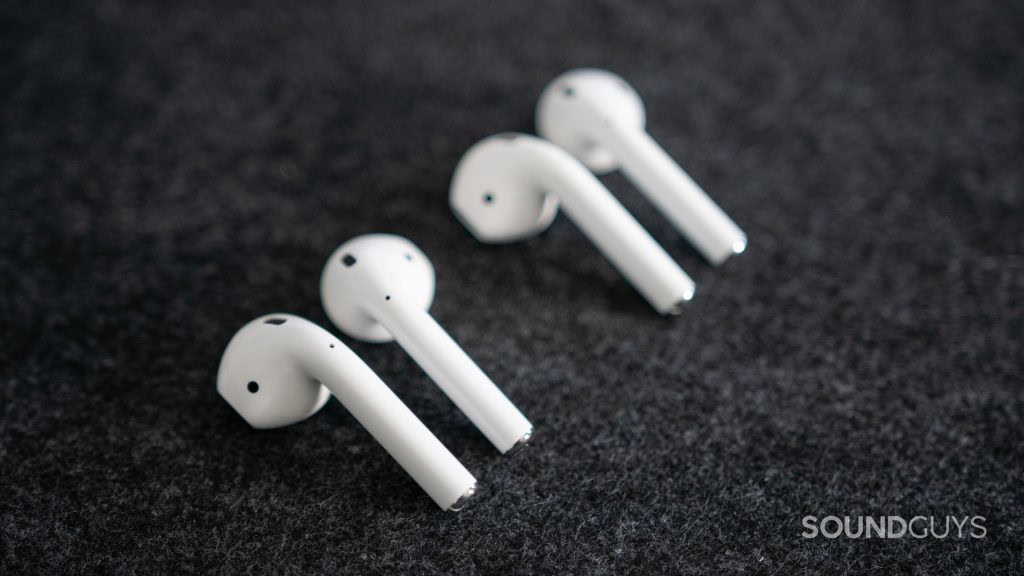
With an IPX4 water-resistant rating, the AirPods Pro are also more durable than their predecessors. The sweat and water resistance makes the AirPods Pro a much better workout companion than the old AirPods. The improved fit also means the earbuds are more likely to remain in your ears. Many people risk using the older AirPods in the gym, just note that any water damage won’t be covered by the warranty.
Onboard controls
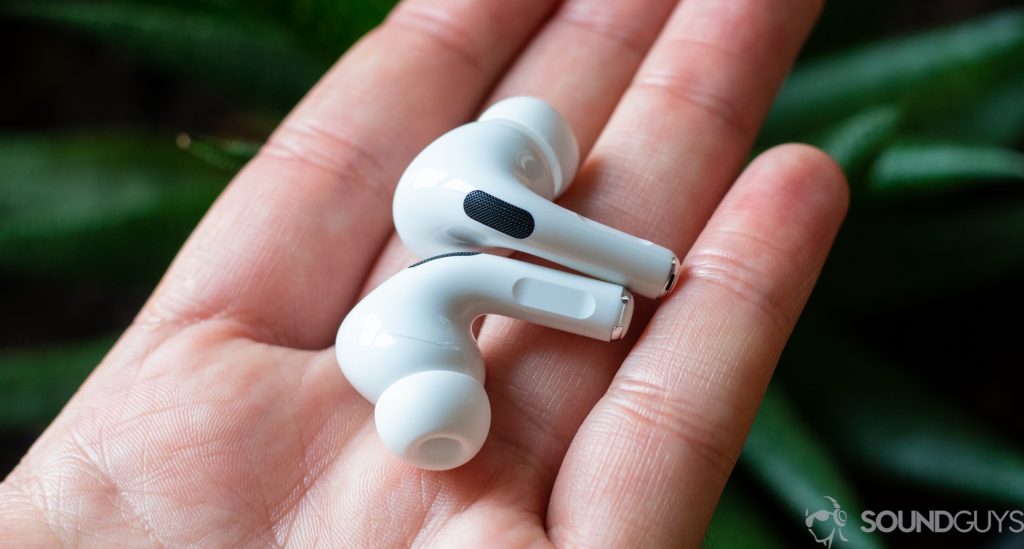
The AirPods Pro feature an indentation on either stem for touch controls, whereas the older AirPods use touch controls that require you to tap the outside of the earbud. The Pro uses force sensors that register short and long squeezes against the stem. On both sets of earbuds, functionality can be customized by entering your iPhone’s Bluetooth settings and selecting the “i” icon next to your device. This allows for easy control over what happens with each combination of touches or presses.
See: The best AirPods deals available right now
If you’re using an iPhone, you’ll get automatic ear detection on both the AirPods Pro and AirPods (2019). Music automatically pauses when you take them out and resumes when you put them back in, although you can toggle this off within the iOS device settings if you so choose.
Charging case
![]()
The AirPods have a two-tiered purchasing option, with either a standard charging case or Qi wireless charging case for an extra $40. The AirPods Pro always comes with a wireless charging case, so no need to worry about extra costs. Wireless charging certainly isn’t a must-have feature, but anyone who already has a Qi wireless charger lying around the house will appreciate it.
Software features
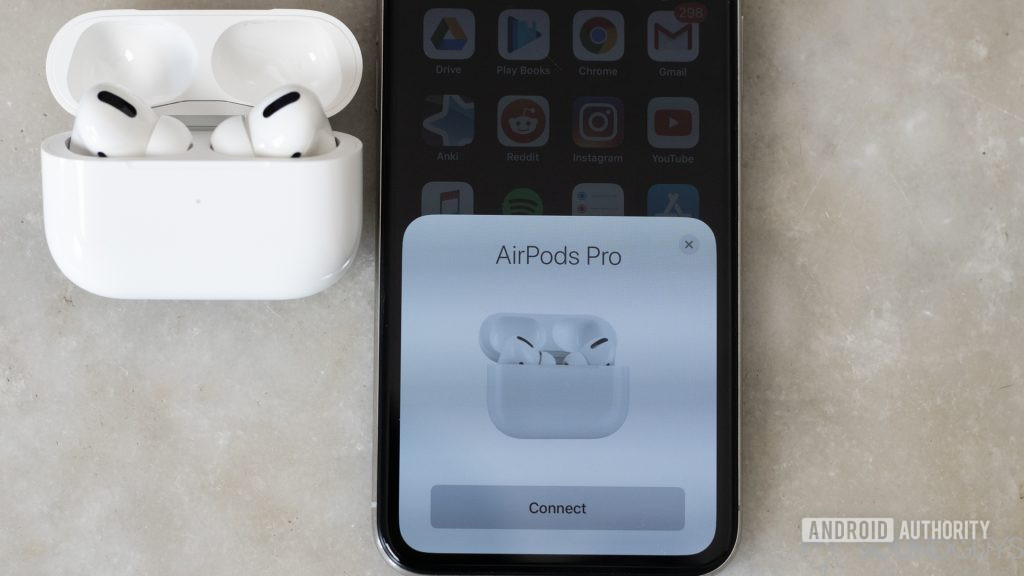
For those with iPhones running iOS 14, users can now use automatic device switching with other Apple devices as long as they are all under the same iCloud account. Both AirPods models also have accessibility options for a customizable audio profile and volume safety monitoring.
Related: What makes a good set of in-ear headphones?
Battery status notifications are available with both the AirPods and AirPods Pro, so you’ll never forget to charge. A battery optimization feature on both AirPods learns your daily charging routine and refrains from charging past 80% until necessary. True wireless earbud battery lifespan is notoriously short, but this should help extend the life of your AirPods.
Both the AirPods and AirPods Pro support spatial audio with Dolby Atmos through Apple Music or an Apple TV 4K. Spatial audio mimics surround sound on tracks mixed for Dolby Atmos. To be clear, only the AirPods Pro (and AirPods Max) support spatial audio with dynamic head tracking.
Connection quality and Bluetooth codec support

Both sets of AirPods connect seamlessly to Apple devices and support the high-quality AAC Bluetooth codec. They also both have the integrated H1 chip, which facilitates hands-free Siri access, streamlined usage across Apple devices, and greater energy efficiency over non-H1 chip headsets.
Become an expert: Understanding Bluetooth codecs
While the connection is great within the Apple ecosystem, the same can’t be said when using either the AirPods or AirPods Pro with an Android device. AAC doesn’t handle universal streaming across Android devices and performance is dubious at best. Android users still get Bluetooth 5.0 and can stream over the AAC codec, but you might want to force SBC streaming for more consistent streaming quality.
Battery life
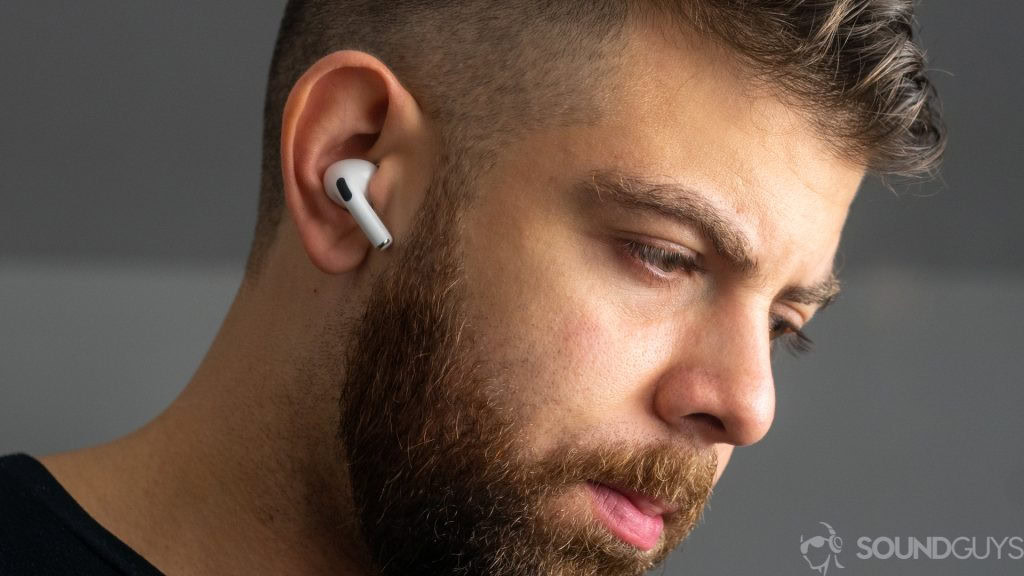
The AirPods Pro consistently outlast the AirPods (2019). In our testing at a constant 75dB(SPL) output via an iOS device, the AirPods (2019) lasted four hours and eight minutes, while the AirPods Pro managed an impressive five hours and seven minutes with noise-cancelling on. Both tests were done with music streaming over an AAC Bluetooth connection.
With the charging case, both AirPods are able to make it through 24 hours of combined playback. The charging cases also feature quick charging. The older model supplies 180 minutes of playback from 15 minutes of charging, and the AirPods Pro case provides 60 minutes of playback from five minutes of charging. Your math isn’t wrong, that is the exact same amount, Apple just decided to change its wording on the official specifications page.
Sound quality
For the cost of the AirPods Pro or even the AirPods (2019), you should expect something that sounds good. The tight seal created by the ear tips on the AirPods Pro certainly helps in this regard. In the frequency response charts, the cyan line represents a product’s frequency response and the pink line represents our sister site SoundGuys’ house curve (what it deems as the platonic ideal for this particular type of audio product).
The AirPods Pro have a more neutral-leaning bass response than the older AirPods. This means the Pro variant will make your music sound closer to how the artists and engineers intended. You can’t create a custom EQ through the iOS Settings app with either set of earphones, so what you hear is what you get.
Since the original AirPods don’t block out environmental noise, the boost in bass is likely an attempt to counteract the effects of external auditory masking. In a controlled environment, the AirPods (2019) have a more exaggerated low-end, but bass notes quickly become hard to hear when you step on a noisy train platform.
Don’t miss: Apple Music vs Spotify Premium
You may find it harder to perceive treble detail when listening to the AirPods (2019) compared to the AirPods Pro, because of the former’s bass emphasis which is as loud or louder than subsequent treble frequencies. This means that you might have a hard time hearing cymbal resonances and vocal harmonies during loud song segments. Neither AirPod model provides a perfectly accurate representation of an original audio file, but both follow a generally accepted consumer-friendly sound signature.
Noise-cancelling and isolation
Isolation on the AirPods (2019) is pretty much non-existent due to the lacking seal. The AirPods Pro on the other hand is able to effectively attenuate both low and high-frequency sounds through the combination of a tight seal and active noise cancellation.
In the charts above, the higher up the line, the more attenuated a certain frequency is. Isolation alone is able to block many high-frequency sounds. Turning on noise-cancelling reduces low-frequency sounds (e.g. the rumble of an engine or A/C unit) to about half as loud as they would be without ANC.
Squeezing the stems on the AirPods Pro toggles between three listening modes: noise-cancelling, off, and transparency. Transparency mode has the opposite effect as noise-cancelling, and increases the volume of outside noise for increased awareness of surroundings.
See also: Apple AirPods Pro vs Samsung Galaxy Buds Pro
Microphone quality
The AirPods (2019) are great for taking calls, thanks to the solid microphone and assortment of sensors and accelerometers packed into each earbud. Apple further improved this technology with the AirPods Pro, resulting in an even better microphone response. You can listen to the AirPods and AirPods Pro mic samples here.
Apple AirPods Pro vs AirPods: The verdict
If you’ve read this far, then you already know that the AirPods Pro are far superior to the AirPods. If you have an iPhone and are looking for true wireless earbuds, the AirPods Pro are worth saving for. That said, there are plenty of AirPods alternatives worth checking out, including the Beats Powerbeats Pro.
What about the Apple AirPods Max?
The Apple AirPods Max are essentially the AirPods Pro transformed into a pair of on-ear headphones. These headphones have an ultra-premium design with a mesh knit canopy headband, stainless steel frame, and a digital crown on the ear cups inspired by the Apple Watch. It’s an unconventional design that Apple claims are designed to balance comfort with acoustic performance.
The AirPods Max have incredible noise cancellation that outperforms the AirPods Pro and other competitors such as the Sony WH-1000XM4 and Bose noise-cancelling Headphones 700. Three outward-facing microphones work to attenuate ambient noise, while one inward-facing mic is used to combat inner-ear resonances.
See: Best headphone deals available right now
Other features that the AirPods Max borrow from the AirPods Pro include Transparency Mode, Adaptive EQ, and Spatial Audio. The headphones also have a battery that can last 20 hours on a single charge, with fast charging that can provide 90 minutes of playtime with only five minutes of charging.
from Android Authority https://ift.tt/2Vxk2IH

Post a Comment